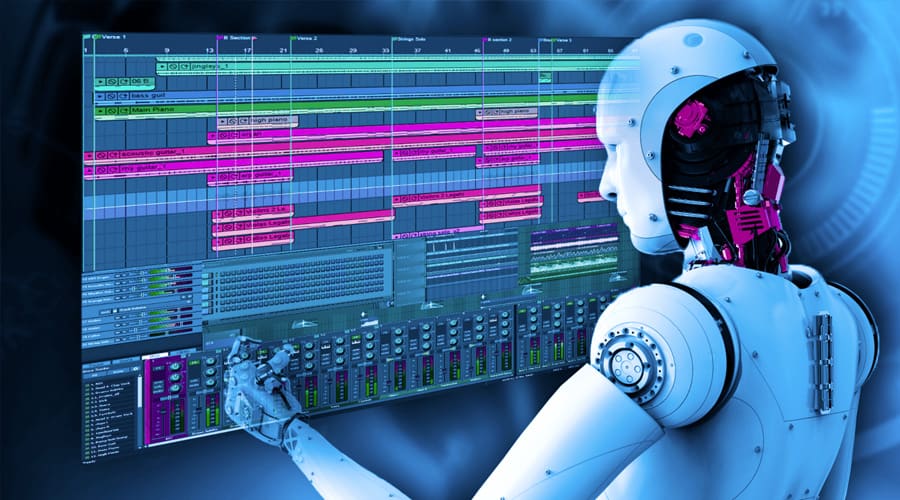Have you ever had a catchy tune stuck in your head, but couldn’t place where you heard it? Maybe it wasn’t a human-composed song after all. As April 2024 dawns, the music industry continues its rapid evolution, with artificial intelligence (AI) increasingly involved in songwriting and music creation. The idea of an AI penning your next favorite earworm may seem far-fetched, but it’s a reality that’s already taking shape.
AI Revolutionizes Music Creation
AI algorithms excel at analyzing vast datasets to identify patterns and generate new content based on those patterns. In the realm of music, AI can study entire catalogs of songs across genres, breaking down the intricacies of chord progressions, melodies, rhythms, and lyrical themes. Armed with this deep understanding of musical composition, AI systems can then generate original musical ideas.
The ways AI is being leveraged for music creation are diverse. Some AI tools focus on generating brand new melodies and chord progressions from scratch, while others specialize in suggesting lyrics based on a given theme, mood or musical style. Increasingly, AI is being used as a collaborative tool, working alongside human musicians to spark creative ideas and explore untapped musical territories.
Examples of AI-powered Music Platforms
Several platforms have emerged to harness AI for music creation. For instance, Amper Music employs AI to generate full music tracks, allowing users to fine-tune various elements like instrumentation, tempo, and genre. Meanwhile, Popgun presents an AI co-writer that suggests melodic and lyrical ideas for songwriters to build upon. These platforms cater to everyone from professional musicians and producers to aspiring bedroom artists.
A Critical Look at AI Songwriting
The integration of AI into music production offers exciting potential benefits. AI can dramatically increase efficiency, enabling musicians to explore a vast expanse of musical ideas rapidly. It also promises to democratize music creation by providing powerful songwriting tools accessible to anyone, regardless of formal training.
Moreover, AI opens up possibilities for highly personalized music experiences. By understanding each listener’s preferences, AI could compose tailored songs crafted specifically for an individual’s unique tastes.
However, the rise of AI songwriting is not without concerns. Many worry that AI-generated music may lack the raw human emotion and authenticity that resonates so deeply with listeners. There are also complex ethical questions surrounding the ownership and royalty rights for music created with the assistance of AI.
The mp3juice Conundrum
One notable ethical dilemma surrounds the use of online platforms like mp3juice, which facilitate downloading music files, often in legal gray areas. While avoiding any endorsement of such services, it’s important to recognize the implications of using them to acquire music for training AI systems.
Leveraging copyrighted music without proper licensing could be seen as a violation of artists’ intellectual property rights. As the AI music scene evolves, it will be crucial to uphold copyright laws and support musicians through legitimate streaming platforms. Ethically sourced data will be key for AI’s long-term role in the industry.
The Future of Music: Human-AI Collaboration
Looking ahead, the future of music production seems poised to become an ever-closer collaboration between human creativity and AI capabilities. While AI may be able to generate competent musical compositions, it currently lacks the raw creative spark and personal expression that human artists bring to the table.
The true power likely lies in a symbiotic partnership, where AI serves as an enhanced tool to augment and inspire the human creative process. AI could surface novel musical ideas that spark new artistic directions for musicians to explore and refine with their personal sensibilities.
Moreover, AI opens exciting possibilities for reimagining how we experience and interact with music. From personalized playlists to dynamically evolving songs that adapt to each listener’s mood, AI provides a canvas for highly tailored and immersive musical journeys crafted specifically for each individual.
Conclusion
As AI continues advancing by leaps and bounds, its presence in the music world seems all but inevitable. While the prospect of AI-generated hit songs may seem jarring at first, it’s crucial to recognize AI’s role as an extraordinary creative aid, not a replacement for human artistry.
With the right ethical guardrails in place, the merging of human ingenuity with AI’s powerful pattern recognition abilities could usher in a new era of boundary-pushing musical expression and personalized listening experiences. As this fusion unfolds, music fans and creators alike should remain open-minded to exploring the artistic possibilities that this human-AI synthesis could unlock.







